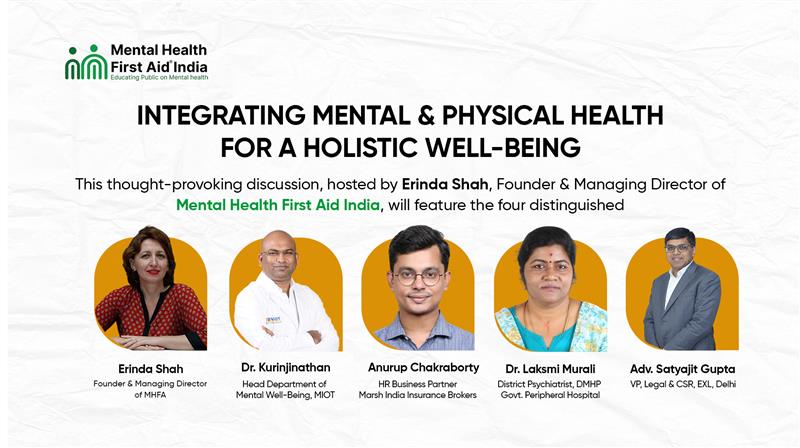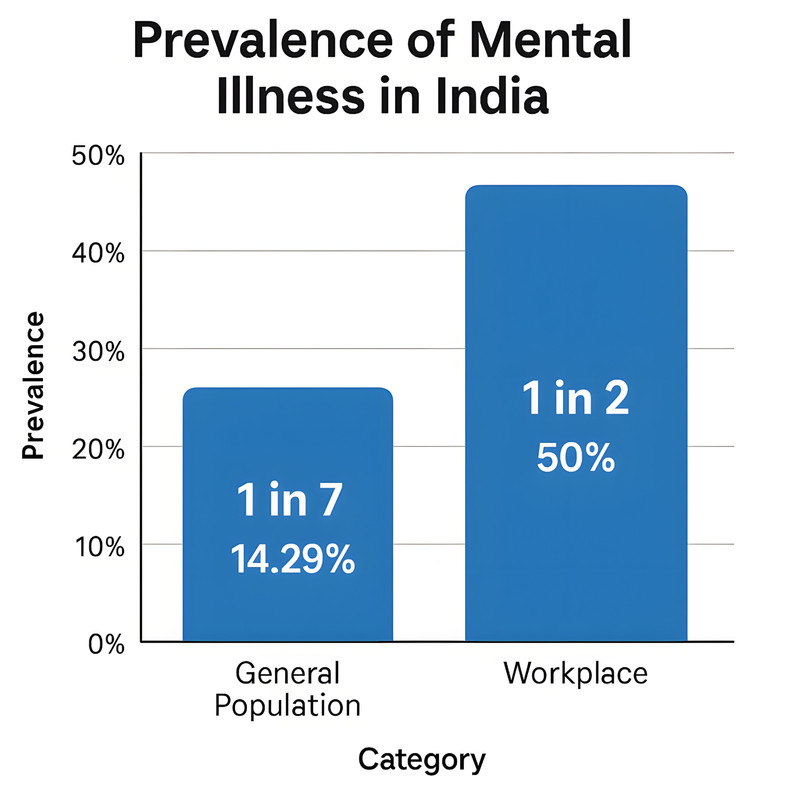Integrating Mental and Physical Health for Holistic Well-being in India

As part of MHFA India’s commitment to integrated health, we hosted a panel discussion on “Beyond Boundaries: Integrating Mental & Physical Health for Holistic Well-being.” The conversation brought together experts from psychiatry, law, corporate wellness, and insurance—Dr. Lakshmi Murali, Dr. Kurinjinathan, Advocate Satyajit Gupta, and Anurup Chakravarthy—moderated by MHFA India’s Managing Director, Erinda Shah.
This article captures key insights from the discussion, emphasizing why integrating mental and physical health is essential for India’s collective well-being.
The Prevalence and Impact of Mental Illness in India
Mental health is fundamental to every facet of life, influencing our emotional, social, and physical well-being, as well as our relationships, work, and community involvement. The World Health Organization (WHO) emphasizes that mental health is a vital asset that must be protected and nurtured for individuals and communities to thrive. In India, a concerted effort to integrate mental and physical health is crucial for the overall well-being of the population.

Mental illness is more prevalent in India than many people realize.
Prevalence: One in seven individuals in India is expected to experience a mental illness in their lifetime. (Indian Council of Medical Research (ICMR), 2017)
Workplace Impact: Every second employee reports experiencing anxiety or depression due to work-related stress.(LinkedIn Workforce Confidence Index, 2021)
The consequences of mental illness extend beyond the individual to families, communities, and the broader economy. In 2017, an estimated 197.3 million Indians lived with a mental health condition, resulting in the loss of 2,443 disability-adjusted life years (DALYs) per 100,000 people. These DALYs reflect the years of healthy, productive life lost—affecting not just health outcomes but economic and social progress.
The age group most affected is between 30 and 45 years—a period associated with major life responsibilities and career growth.
“Mental health is not just a personal issue—it’s a systemic economic challenge that demands urgent, integrated solutions.”
The Treatment Gap and the Need for Integrated Services
Despite the widespread impact of mental illness, a significant treatment gap persists. Only 2 to 3 out of 10 individuals who need mental health support actually receive it—leaving nearly 70–80% without care.
To bridge this gap, it is critical to integrate mental health with general healthcare services. Such integration ensures that people are treated as whole individuals, not just through isolated physical or psychological lenses.
Government Initiatives and Services
Recognizing this need, the Indian government—along with progressive state initiatives like those in Tamil Nadu—has made efforts to expand community-based mental health care. Tamil Nadu’s District Mental Health Program (DMHP), initiated in 1997, focuses on awareness, treatment, and community participation.
Key initiatives under DMHP include:
- Mental health professionals stationed at Primary Health Centers (PHCs).
- Awareness programs in schools, colleges, and workplaces.
- Specialized projects like Margam and Manam bring psychiatric care into faith-based spaces, allowing individuals to receive treatment without disrupting their spiritual practices.
- De-addiction centers, emergency recovery units, and halfway homes.
- Tele-helplines and digital consultations.
- Mental health support for students and police personnel.
“With just two psychiatrists per district, the public infrastructure is under tremendous strain. Awareness is still low, and clinics are often overcrowded.”
There are also gaps in utilization. Many middle- and upper-income populations are either unaware of or hesitant to use public services, due to stigma or perceptions of lower quality.
To address these limitations, India must:
- Increase funding and human resources for mental health.
- Raise awareness to reduce stigma.
- Ensure cross-sector collaboration for service delivery.
The Private Sector’s Role in Expanding Access
Private hospitals and health systems are also evolving in their approach to mental health. Institutions like MIOT International are leading the way by adopting integrated, community-friendly models.
Their approach includes:
- Engaging with corporate offices and schools to promote mental well-being.
- Detecting underlying psychological distress in patients presenting with physical symptoms.
- Rebranding their psychiatric department as the Department of Mental Well-being, to reduce stigma.
“We’re working with schools and corporates to run burnout and substance-use campaigns—but prevention rarely attracts investment because ROI is hard to quantify.”
Private initiatives can drive early identification and reduce stigma, but they face funding limitations—especially when it comes to prevention and public awareness.
The Legal Framework
Legal and financial support systems play a crucial role in promoting access and protection.
India’s Mental Healthcare Act (2017) provides a robust legal foundation for rights-based care. Yet, enforcement remains inconsistent.
Regarding the legal treatment of individuals with mental health conditions. Key points include:
- Inconsistent Judicial Approach: Courts often lack a uniform approach in handling cases involving individuals with mental illness, with decisions varying based on individual judges.
- Need for Judicial Training: There is a need for training and sensitization of judges at all levels to ensure more informed and consistent handling of these cases.
- Law Enforcement Sensitization: Police officers also require training to respond to situations involving mental health with compassion and understanding.
- Enforcement of Rights: Individuals often face challenges in enforcing their rights due to systemic issues within the legal system, such as slow judicial processes.
Gupta also emphasized the need to protect the rights of individuals experiencing mental health struggles, even if they haven't been formally diagnosed. He pointed out the importance of:
- Preventive Measures: Promoting well-being and encouraging self-care through initiatives in educational institutions and corporations.
- Corporate Responsibility: Advocating for companies to establish minimum standards for employee mental well-being, including balanced work-life situations.
- Legislative Action: Calling for potential legal interventions, such as a "right to disconnect" to ensure a better work-life balance.
Insurance: A Critical Missing Piece
Access to care also hinges on affordability—and right now, insurance is a major barrier. Despite a 2018 IRDAI mandate requiring mental health parity, most policies still exclude or limit mental health coverage. Anurup Chakravarthy of Marsh Insurance explained:
- Only 1% of claims are for mental health.
- Many employees don’t know about Employee Assistance Programs (EAPs).
- Even when services are available, stigma stops people from using them.
He urged HR leaders to negotiate stronger mental health coverage, noting that for every $1 spent on mental health, companies see a $4 return in productivity. Marsh also guides corporates in risk-reduction strategies, including mental health training like MHFA.
The Shift from Treatment to Prevention
Panelists agreed that India must move from a reactive model to one centered on prevention and early intervention.
Key preventive strategies include:
- In Schools: Training teachers to identify early signs and promote emotional skills.
- In Families: Equipping parents with psychoeducation and communication tools.
- In Workplaces: Promoting psychological safety, flexible policies, and proactive HR support.
- At the Community Level: Encouraging open conversations and reducing stigma.
“Scaling these solutions will require collaboration, innovation, and courage—from all of us.”
The Way Forward
To build a resilient, mentally healthy society, India must:
- Increase public awareness and reduce stigma.
- Invest in infrastructure, professionals, and integrated care.
- Strengthen insurance coverage and workplace policies.
- Ensure legal enforcement and education across sectors.
- Support community-based programs through CSR and NGO partnerships.
- Promote preventive action across life stages and settings.
Mental health is not separate from physical health—it is deeply interconnected. And it must be treated as such across healthcare, education, law, and corporate systems.
India stands at a turning point. With the right strategies, investment, and compassion, we can transform the mental health landscape—creating a society that is not only healthier, but also more humane, inclusive, and strong.
What’s one way you can bring mental well-being into your life, workplace, or community today? Comment us below!


